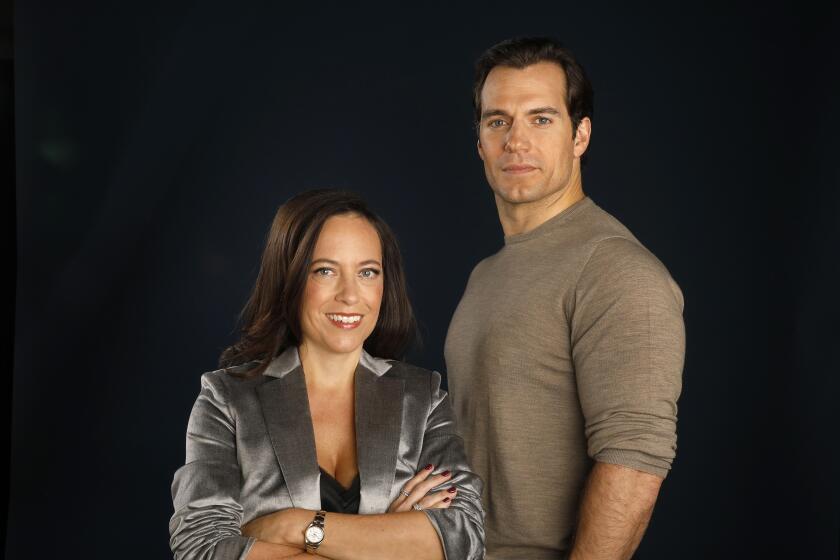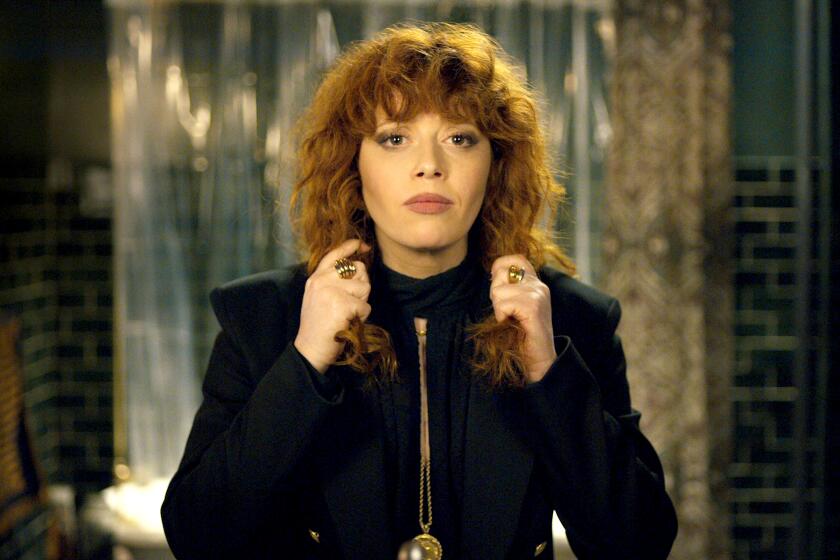How ‘The Witcher’ team brought ‘the best monster’ in its fictional universe to life

The following story contains spoilers for Season 2 of “The Witcher.”
Showrunner and executive producer Lauren Schmidt Hissrich was as committed as ever to keeping things light in Season 2 of “The Witcher.” No easy feat with an ancient tale about a monster hunter who thinks he’s a monster himself.
“We’re always looking for places in ‘The Witcher’ world to bring them a little bit more optimism,” she said via Zoom, noting the change in the color palette and additional humor in the show. “There’s this sort of idea that medieval fantasy has to be dark and gloomy and dusty and dirty. But people amid that darkness have to find the things that bring them joy and find the things that are funny.”
All the twists and time-turns in the world couldn’t obscure the winking nature “The Witcher” established in its first season: Who would forget star Henry Cavill in a bathtub in a scene straight from the video game (or some racy Superman fanfic)? That carries into Season 2, even with the addition of key figures and locations from the books; a determined-to-fight Princess Ciri (Freya Allan); a newly talkative hero, Geralt of Rivia; the now low-spirited and alone bard Jaskier (Joey Batey); and the increasingly desperate mage Yennefer (Anya Chalotra). That’s growth, says Hissrich.
“You know, we set up all of these sort of roles, how characters relate to one another. And then I think basically in Season 2, we explode all of that,” she said.
Henry Cavill and Lauren Schmidt Hissrich discuss Netflix’s spin on the fantasy book series “The Witcher,” which has also spawned a video game franchise.
Hissrich is ebullient as she talks about “The Witcher” — even when she talks about fan discontent. This is a show that knows its fans and takes what they say to heart. And to the screen, when a dockworker criticizing Jaskier’s songs becomes a mouthpiece for fans.
“There’s a great self-awareness in what we do. There’s an actual unicorn in our show! I don’t want to shy away from sort of this fantastical, fun bonkers world that [author] Andrzej Sapkowski set out,” she said. “And part of that is being able to make fun of ourselves. And that scene with Jaskier and the dock guard is one of my absolute favorites. The writers and I came up with a whole list of things that we thought viewers weren’t so happy about. And we chose our favorite few to really give the audience that sort of voice from the dock guard, and to say, ‘You have some bones to pick and we hear you.’”
So it’s no stretch to think that the choice of monsters for this season might be fan-influenced too. Including a fan favorite, the leshen.
“We always do a deep dive with monsters,” said Hissrich. “And we talk about it from a couple of different perspectives. One, what are the monsters that are really well-known from the books and the games, of which the leshen factors into strongly? What are the monsters that are really big in Slavic folklore? … Part of the reason we landed on leshy is we felt like, obviously, both present from the books, but also super present for our audience. And then we had a chance to make it our own.”
Taken from Slavic folklore (don’t @ me, Middle-earth), the leshen is a forest spirit usually depicted as a humanoid tree with a deer skull for a head. The monster has several iterations throughout the Witcher Universe of books and video games. The Netflix series made more.
“Now, there are two versions of the leshy in our show. And that was very important to us, because our season is really about the mutations of monsters, and that the monsters on the continent are shifting and changing,” said Hissrich. “That’s obviously Geralt’s big mystery for the season … So we wanted to make sure that we saw two different types of leshies, so that we could understand that the monsters are changing in front of our face too.”
Whatever the monster does and even what it looks like are in service to the story. That’s especially so when it comes to leshy No. 1 and the witcher Eskel (Basil Eidenbenz), who some fans had hoped would be a major character in the series.
Eskel returns to the witchers’ home, Kaer Morhen, after fighting a leshy — and brings part of the leshy home with him. In werewolf fashion, he starts to become one. So a celebration turns into a fight against his former compatriots.
“It’s a fairly fantastic idea for a creature,” said production designer Andrew Laws. “This one was really drawn out of how we tell the story of this character being subsumed by this sort of infection or this takeover, or mutation.”
We surveyed The Times TV team to come up with a list of the 75 best TV shows you can watch on Netflix. As in, tonight.
To that end, he and his team tried to establish “loose” rules for their leshies in order to work in tandem with visual effects and motion. In the end, with leshy No. 2, they got what Hissrich and Co. call the “queen leshy,” standing guard in the forest: “beautiful” and “terrifying” yet “elegant,” “the best monster of ‘The Witcher’ monster world.”
That’s high praise — and even higher expectations. But helping to bring the leshy to live-action was not daunting for Laws.
“It’s exciting, actually, more than anything, to see the audience reaction, particularly the diehard fans to these things, because we do work very hard,” he said.
And though they’re mum on the specifics, Hissrich and Laws are eager to play with the mystery of the mutating monsters even more in Season 3.
“Season 2, we push things to a new bar, to a new level,” Laws said. “And with moving into Season 3, a lot more variation. ... It’s a continuing journey and a continuing challenge and a great responsibility. There was a very early realization that the audience just wanted more and that there was a big responsibility in delivering things that were new and unique.”
The complete guide to home viewing
Get Screen Gab for everything about the TV shows and streaming movies everyone’s talking about.
You may occasionally receive promotional content from the Los Angeles Times.






